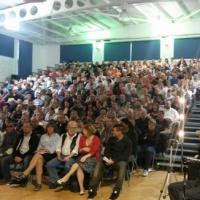
Over 18,000 people have attended Hope Over Fear public meetings to hear socialist Tommy Sheridan.
In the final campaign fortnight, the polls for the Scottish independence referendum are tightening, with support for independence increasing to its highest level yet.
A September 1 YouGov poll, excluding undecided voters, shows support for independence shooting up by eight points in a month to 47%. Support for a No vote is now only six points ahead on 53%, down from a lead of 14 points in mid August.
Rather than just an irritation, support for a Yes vote is now a major crisis for the majority of Britain’s capitalist elite. Prime Minister David Cameron openly speaks of his “concern” and “nervousness” about the prospect of independence.
The wheels of Project Fear, the No coalition, of the Tory, New Labour, Lib Dem “Better Together” continue to whir into frantic overdrive. The whole spectrum of establishment and “authority” figures, from the CBI big business lobby to celebrities, to managements of elite Scottish universities, form an increasingly shrill warning chorus of the dire consequences of independence.
Labour leader Ed Miliband has announced he will be moving to Scotland until the end of the referendum. He doesn’t want to be prime minister of the UK that doesn’t include Scotland, he claimed. Labour’s support for the No campaign and Project Fear is doing colossal damage to what was left of the party’s reputation among the working class.
The level of attempted blackmail has been unprecedented, but Project Fear has been a desperate failure in holding back a rising tide of support for Yes.
Cameron and Miliband’s fears are justified. The clear support for independence, visible across towns and cities with stickers, street stalls, posters and banners, both official and homemade, is a desire for fundamental social and economic change for millions of working class and young people.
In fact the recent You Gov poll found support for Yes had increased by 9% among the C2DE working class social group. It’s already being predicted that working class areas of Scotland, including Dundee and Glasgow could see a majority Yes vote.
A Yes vote would represent a protest against the endless austerity of the past period, a chance to raise opposition to inequality and cuts that the main political parties will not contemplate.
Media and economic commentator Paul Mason, in a recent Guardian article, says “Something incredible is happening in Scotland. When political enthusiasm reaches the relatively apolitical world of the council estate, the pub, the nightclub and energises people, turnout can do weird things to poll predictions…. They have heard all the dire macro-economic warnings – about the pound, the banks, the debt, the non-reliability of oil money. Set against the idea of making a clean break with Westminster politics and neoliberal economics, these are risks many of them are prepared to take….. If it happens there’ll be a lot of finger pointing, but it’s obvious in advance where the biggest problem lies: it’s become impossible to express opposition to free market economics via the main Westminster parties.”
Paul Mason is wrong when he describes council estates as “relatively apolitical”. The majority are completely alienated from the capitalist political establishment, but there is intense anger at cuts and falling living standards and a desire for change.
Increasing numbers are actively campaigning for a Yes vote and flooding into public meetings. In sharp contrast to recent elections, with lower and lower turnouts and little enthusaism for the discussion on offer from mainstream politics. This is a reflection of a building of widespread excited hope that a Yes vote is becoming a realistic possibility and could be a chance, for the first time in many peoples lives, to change the conditions that workers and young people face.
This excitement and expectation is in spite of the attempts by Salmond, the SNP and the leadership of the official Yes campaign to not raise hopes too high as to what independence, on a capitalist basis, can deliver.
The outcome of the referendum is now harder to predict. Tension has increased on the streets with the No campaign claiming intimidation from Yes campaigners.
Right wing New Labour politician Jim Murphy, on his “No Thanks” soapbax tour of town centres, has been met with enraged shoppers turned hecklers and even eggers who point out his party’s record of cuts.
There are also elements of the broader No campaign that aim to further stoke divisive racist and sectarian tension. Ukip’s Nigel Farage is coming to Scotland during the last week of the campaign to “save the union”. The Orange Order are holding a national demonstration against Independence in Edinburgh in the last week of the campaign.
The major factor in the No campaign still maintaining a lead are the genuine doubts about whether an independent capitalist Scotland can deliver for the majority. The SNP’s promises to lower taxes for big businesses and continue austerity cuts are still a major obstacle to a Yes majority.
In contrast the Hope Over Fear – Socialist Campaign for Independence tour, with well known socialist Tommy Sheridan speaking, in which Socialist Party Scotland is participating, is holding larger and larger meetings. This shows that raising socialist policies and ideas such as using the powers of independence to end austerity, for public ownership of oil and gas and the banking system, and a living wage gains a mass audience and is boosting support for a Yes vote.
Socialist Party Scotland while energetically building support for a Yes vote, has clearly explained the need for the powers of independence to be used to end austerity cuts and for public ownership and democratic control of the major parts of the economy. Only through socialist policies, an independent socialist Scotland as part of a wider voluntary socialist confederation, can working class peoples lives and conditions really be transformed. Workers and young people also need a new party of their own for fight for our interests.


Be the first to comment